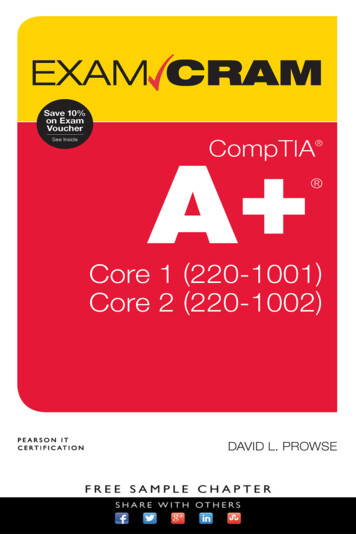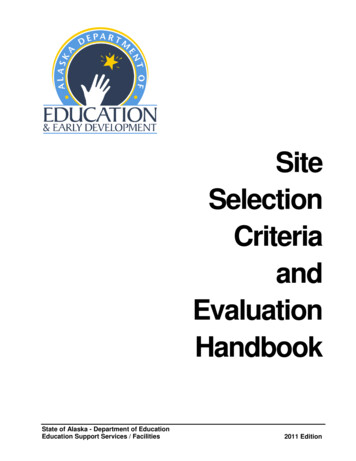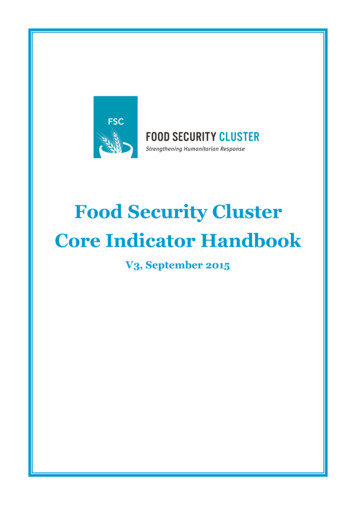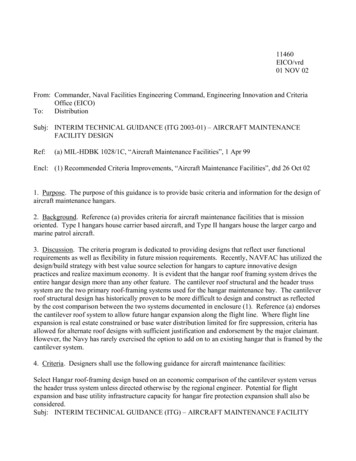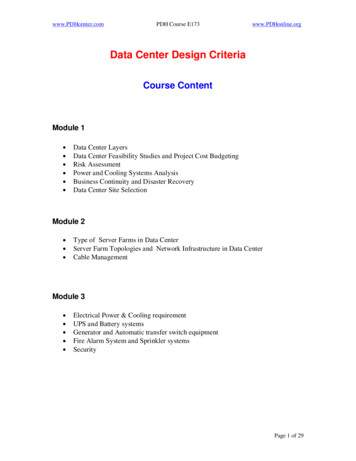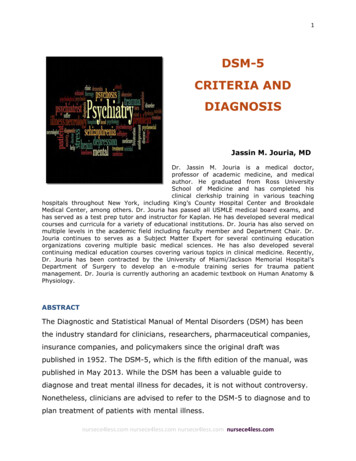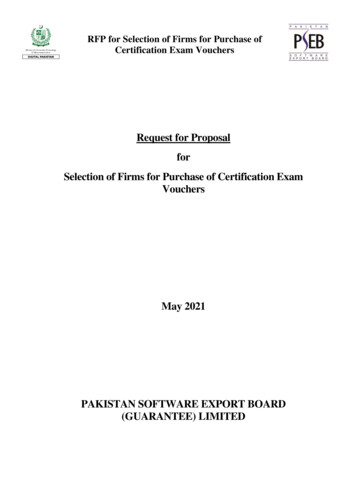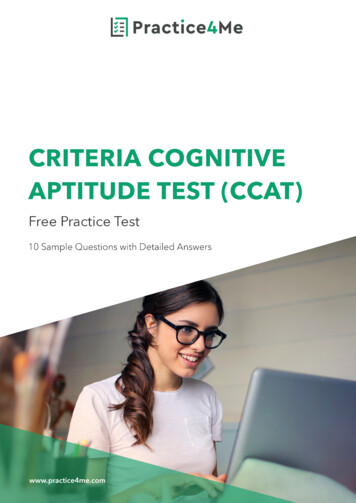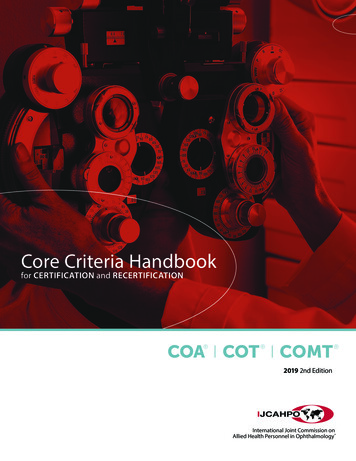
Transcription
Core Criteria Handbookfor CERTIFICATION and RECERTIFICATIONCOA I COT I COMT 2019 2nd EditionInternational Joint Commission onAllied Health Personnel in Ophthalmology
CERTIFICATIONOFFERSEMPOWERMENTIJCAHPO has set the bar of excellence in allied ophthalmichealth since 1969 with over 26,000 ophthalmic professionalschoosing IJCAHPO certification. By achieving certification, joinan exceptional group of certified professionals demonstratingyour specialized knowledge and continuing competence. Bybecoming IJCAHPO certified, you demonstrate your commitment to delivering the best patient care and advancing yourcareer potential.This handbook provides information onthe following IJCAHPO core credentials: Certified Ophthalmic Assistant (COA )TO REALIZEDREAMS ANDIMPROVE LIVES. Certified Ophthalmic Technician (COT ) Certified Ophthalmic Medical Technologist (COMT )This information includes eligibility requirements for eachcredential and outlines the body of information that individualsseeking allied ophthalmic certification are expected to knowand demonstrate to earn certification. This handbookprovides detailed information which outlines the entirecertification process.IJCAHPO’s certification staff welcomes questions regarding thecertification or recertification process.Contact InformationIJCAHPOThe Value of CertificationFour out of five ophthalmologists agree thatcertified Allied Ophthalmic Personnel (AOP)render their practice more productive. Studieshave shown that certified AOP contribute morethan non-certified personnel to the efficiencyand quality of care in a practice. Just as in otherprofessions, the value of certification and theimportance of employing educated, trained,and qualified professionals should be a bestpractice in ophthalmology.Copyright 2019 International Joint Commission on AlliedHealth Personnel in Ophthalmology, Inc. Printed in the USA.Certification Department2025 Woodlane DriveSt. Paul, MN 55125Phone (651) 731-2944Toll Free Phone (800) 284-3937Fax (651) 731-0410Email: jcahpo@jcahpo.orgwww.jcahpo.org
TABLE OF CONTENTSSection One. 2-3ABOUT IJCAHPO IJCAHPO MissionIJCAHPO HistoryIJCAHPO PurposeNational AccreditationPurpose of IJCAHPO CertificationPurpose of IJCAHPO RecertificationStandards of Ethics of the Allied Ophthalmic ProfessionScope of Practice of the Allied Ophthalmic ProfessionStatement of Non-DiscriminationStatement of Special AccommodationsSection Two. 4-7ELIGIBILITY Core CertificationsSpecial ConsiderationRetirement CredentialInternational Council of Accreditation (ICA)Section Three. 8-14CORE EXAMINATION CONTENTAREA BREAKDOWNSection Four. 15-16EXAMINATION CONTENTAREA PERCENTAGES Multiple-Choice ExaminationsCertified Ophthalmic Assistant (COA)Certified Ophthalmic Technician (COT)Certified Ophthalmic Medical Technologist (COMT) COT Skill Evaluation and COMT Performance TestsCertified Ophthalmic Technician (COT) Skill EvaluationCertified Ophthalmic Medical Technologist (COMT)Performance TestSection Five. 17-18SCHEDULING YOUR EXAMINATION AppointmentsIdentificationCandidate Examination Site Requirements and InstructionsAppointment Changes, Cancellations, or Eligibility ExtensionsTermination of Examination, Administration/Groundsfor Dismissal Appeal Procedures Confidentiality and Use of Certificant Information ACE College CreditsSection Seven.21-22RECERTIFICATION RecertificationEarning Group A CreditsEarning Group B CreditsNon-Certified StatusRevocation of CertificationRecertification Applications AuditsRecertification Alternative to Earning CE CreditsDenial of RecertificationRecertification Appeals ProcessRecertification Consideration for HardshipSection Eight.23-25APPLICATION COMPLETION PROCESS1. Application for Examination Section 1 – Examination TypeSection 2 – IJCAHPO Identification NumberSection 3 – Applicant InformationSection 4 – EligibilitySection 5 – PaymentSection 6 – Responsibility StatementSection 7 – EmployerSection 8 – Sponsor/Employer EndorsementSection 9 – Release of Examination Data2. Submission of Application, Payment andSupporting Documentation3. Approval/Denial of Application4. Application Approval Confirmation Notice5. Submission of Application for PracticalExamination(s) if Required COT Skill Evaluation COMT Performance Test COT or COMT Candidates Pending Successful Completionof Practical Examinations6. Military PersonnelSection Six.19-207. COA Practice ExaminationRESULTS, CREDENTIALS, APPEALS ANDCONFIDENTIALITYAPPENDICES.26-40 Official Examination ResultsValidation of ResultsCertification Upon Passing All Required ExaminationsUse of CredentialsRetesting of IJCAHPO Certification Examinations1. Appendix 1 – Candidate Application2. Appendix 2 – Examination Fees and Timelines3. Appendix 3 – Standards of Ethics4. Appendix 4 – Scope of Practice5. Appendix 5 – IJCAHPO Standards, Proceduresand Sanctions
1.ABOUT IJCAHPOABOUT IJCAHPO (INTERNATIONAL JOINT COMMISSION ON ALLIED HEALTH PERSONNEL IN OPHTHALMOLOGY )Mission StatementNational AccreditationThe International Joint Commission on Allied Health Personnelin Ophthalmology (IJCAHPO) serves to promote global eyehealth and prevent blindness through training programaccreditation, education, and the certification of AlliedOphthalmic Personnel.The National Commission for Certifying Agencies (NCCA)reviews and grants accreditation to IJCAHPO for the administration of the Certified Ophthalmic Assistant (COA).IJCAHPO HistoryIJCAHPO has been a major force in improving eye care since itsinception in the late 1960s. IJCAHPO was created by six medicalprofessional organizations: the American Medical Association,the Association of University Professors of Ophthalmology,American Academy of Ophthalmology, American Association ofOphthalmology, Contact Lens Association of Ophthalmologists,and the Society of Military Ophthalmologists. In the early 1970s,the Canadian Ophthalmological Society joined IJCAHPO. Today,22 ophthalmology professional organizations interested in enhancing quality eye care by certification and education of AlliedOphthalmic Personnel (AOP) are members of IJCAHPO, including two international organizations. IJCAHPO is the only nationaland international certifying agency for the allied ophthalmichealth field and a leading provider of AOP continuing education.The IJCAHPO does not express an opinion regarding thecompetence of any certificant or applicant. Allied ophthalmichealthcare is a multi-specialty field comprised of OphthalmicAssistants, Technicians, and Technologists (with subspecialties insurgical, ultrasound biometry, and sonography).IJCAHPO PurposeIJCAHPO’s purpose is to determine through examination, if anindividual has acquired both theoretical and practical knowledge of allied ophthalmic care. In addition, through the acquisition of continuing education credits or through re-examination,all IJCAHPO certificants are required to stay relevant with theongoing changes in the field of ophthalmology.2The NCCA evaluates certifying agencies on a comprehensiveset of criteria, including appraising the appropriate certificationrequirements, assessing the occupation being certified andweighing both the validity and reliability of the certifyingexaminations, as well as the extent to which the public interestis protected.Purpose of IJCAHPO CertificationIJCAHPO certification demonstrates that the individual meetsspecific criteria for knowledge of allied ophthalmic care.Certified individuals possess the mastery of a broad range ofskills related to ophthalmic patient care.Because certification is voluntary, the decision to becomecertified exhibits the individual’s pride in their profession, thedesire to be recognized for their mastery of the IJCAHPO certification content, and the ongoing commitment to quality patientcare. Certification is an avenue for employment advancement,potential higher pay, and recognition.Purpose of IJCAHPO RecertificationThe purpose of certification renewal is to provide a mechanismto assure the public that IJCAHPO certified allied ophthalmicpersonnel have met current standards of knowledge and skillsrequired to maintain their respective certification. Certification is time-limited, granted for 3-year periodsonly, and must be renewed. IJCAHPO certified allied ophthalmic professionals mustmaintain professional competency based on currentinformation and knowledge affecting their practice.
ABOUT IJCAHPO Knowledge and skills required for professional andcompetent allied ophthalmic professionals evolveover time. Recertification requirements serve to measure andreassure the public of continued professional competencein allied ophthalmic personnel. Without a process for renewal of certification, acredential’s value may diminish over time.IJCAHPO Standards of Ethics of theAllied Ophthalmic ProfessionThe Standards of Ethics of the International Joint Commissionon Allied Health Personnel in Ophthalmology (IJCAHPO) shallapply to persons holding certificates from IJCAHPO that areeither currently certified or to persons applying for certification by IJCAHPO to become certificant holders (Candidates).Certification is a method of assuring the medical communityand the public that an individual is qualified to practice withinthe profession. Because the public relies on certificates issuedby IJCAHPO, it is essential that certificate holders and candidatesact consistently with these Standards of Ethics. IJCAHPO doesnot guarantee the job performance of any credential holder orapplicant (Appendix 3).IJCAHPO Scope of Practice of theAllied Ophthalmic ProfessionAllied Ophthalmic Personnel (AOP) are individuals qualifiedthrough academic and clinical experience to provide patientcare and assistance to ophthalmologists and may hold professional credentials.AOP responsibilities include assisting in the diagnostic evaluation, management, treatment, education, and care of patientswith medical and surgical conditions affecting the visual system.Their scope of practice includes the application of technologyand the use of protocols across all health care delivery sitesincluding, but not limited to, the hospital, the clinic, and thephysician’s office. They enter acquired clinical data and dictatedinformation from the physician into paper or electronic medicalrecords. These activities are supported by education, research,and administration.Allied Ophthalmic Personnel perform assigned duties. AOPmay not diagnose or treat eye disorders and may not prescribemedications; they are not independent practitioners. Theycan provide diagnostic information and clinical data in theophthalmic exam to the physician, who is treating patients, andmay assist in surgery, patient education, and compliance withprescribed treatment. It is not within the AOP scope of practiceto perform any injection technique or similar invasive procedures that involve the placement of needles, trocars, cannulas,or installation devices with and beneath tissue surfaces.1.Patient and family education activities are to promote knowledge and understanding of the eye disease process, medicaltherapy, and self-help. Public education activities focus on thepromotion of visual and eye health and wellness (Appendix 4).IJCAHPO Statement of Non-DiscriminationIJCAHPO does not and shall not discriminate on the basis of race,color, religion (creed), gender, gender expression, age, nationalorigin (ancestry), disability, marital status, sexual orientation, ormilitary status, in any of its activities or operations. IJCAHPOis committed to providing an inclusive and welcoming environment for certificants, non-certificants, members of the staff,clients, volunteers, subcontractors, and vendors.IJCAHPO Statement of Special AccommodationsIJCAHPO provides reasonable accommodations in accordancewith the Americans with Disabilities Act as amended (ADA) forindividuals with documented disabilities who demonstrate aneed for accommodations. In accordance with ADA, IJCAHPOdoes not discriminate against individuals with disabilities inproviding access to IJCAHPO’s certification examinations.The purpose of special accommodations is to providecandidates equal access to IJCAHPO’s examinations.Accommodations are matched with the identified functionallimitation so that the area of impairment is relieved with an auxiliary aid or an adjustment to the testing procedure. Functionallimitation refers to the aspect of a disability that interferes withan individual’s ability to function; that is what someone cannotdo on a regular and continual basis due to their disability.Documentation is required to validate that the applicant for testaccommodations is covered under ADA as a disabled individual. Comprehensive information by a qualified professionalis necessary to allow IJCAHPO to understand the nature andextent of the applicant’s disability and the resulting functionalimpairment that limits access to examinations.ADA Confidentiality: IJCAHPO strictly adheres to a policy ofconfidentiality and does not disclose names of applicantswith disabilities or information concerning the application oraccompanying documentation. Examinations administeredwith special accommodations are not identified to third-partyscore recipients and are scored no differently than examinationsof other certification candidates.3
2.ELIGIBILITYELIGIBILITYEligibility RequirementsIndividuals interested in IJCAHPO certification must first establish eligibility to test. The following information provides the eligibilitypathways for the COA, COT, and COMT. The eligibility pathways should be reviewed prior to submitting an examination application andrelated fees. IJCAHPO retains the sole authority to establish eligibility requirements and final decisions regarding examination eligibility.Core CertificationsIJCAHPO certifications are competency-based and successful completion of the specific examination(s) is required for certification.To be eligible, candidates must meet one of the following education and work experience categories:COACertified Ophthalmic Assistant (COA)LevelRequired EducationRequired Work ExperienceCOA-A1International Council of Accreditation (ICA)accredited clinical training program.1None necessary. If you completed the program more than12 months ago, you will need to submit 18IJCAHPO Group A credits for each year followinggraduation.COA-A2International Council of Accreditation (ICA)accredited non-clinical training program includingdistance learning programs. 1500 hours under the supervision of anophthalmologist within 12 months priorto submitting application. If you completed the course more than 12 monthsago, you will need to submit 18 IJCAHPO Group Acredits for each year following graduation.COA-A3Graduated from High School or the equivalent.andCompleted an approved independent study coursesuch as the JCAT course or the AAO OphthalmicMedical Assisting course. If you completed the course more than 36months ago, you will need to repeat the course orsubmit 18 IJCAHPO Group A credits for each yearfollowing the 36-month period.41,000 hours under the supervision of anophthalmologist within 12 months priorto submitting application.
ELIGIBILITY2.COTCertified Ophthalmic Technician (COT)LevelRequired EducationRequired Work ExperienceCOT-T1International Council of Accreditation (ICA)accredited training program at theTechnician level.1None necessary. If you completed the program more than 12months ago, you will need to submit 12IJCAHPO Group A credits for each yearfollowing graduation.COT-T2Current COA certification & IJCAHPOGroup A Credits. You will need to submit 12 IJCAHPOGroup A credits earned within12 months prior to submittingyour application. Must maintain certification as a COA whilepursuing COT certification.COT-T3 Previous CO or OC(C) certification & IJCAHPOGroup A credits. You will need to submit 12 IJCAHPO GroupA credits earned within 12 months prior tosubmitting your application. Must maintain certification as an Orthoptist whilepursuing COT certification.COT-T4Fast Track Option: Allowsa current COA the use of6,000 hours of non-certifiedwork experience prior tobecoming certified andIJCAHPO Group A credits. You will need to submit 12 IJCAHPO GroupA credits earned within 12 months prior tosubmitting your application. Must maintain certification as COA whilepursuing COT certification.Employed 2,000 hours as a COAwithin 24 months prior tosubmitting application.Employed 2,000 hours as a CO orOC(C) within 24 months prior tosubmitting application.Current COA Certificationand6,000 hours of non-certified workexperience with an ophthalmologistprior to becoming IJCAHPO certified.Verification of previous work experienceneeds to be in the form of a letterfrom your ophthalmologist onofficial letterhead.5
2.ELIGIBILITYCOMTCertified Ophthalmic Medical Technologist (COMT)LevelRequired EducationRequired Work ExperienceCOMT-TG1International Council of Accreditation (ICA)accredited training program at the Technologistlevel & two or more years of college education.1None necessary. If you completed the program more than12 months ago, you will need to submit 12IJCAHPO Group A credits for each year followinggraduation. The credits must be earned within 36months prior to submitting your application. Successful completion of two or more years ofcollege and/or university level courses (90 quarteror 60 semester credits)COMT-TG2International Council of Accreditation (ICA)accredited training program at the Technologistlevel and less than two years of college education.1 If you completed the program more than12 months ago, you will need to submit 12IJCAHPO Group A credits for each year followinggraduation. The credits must be earned within 36months prior to submitting your application.COMT-TG3Previous COT & IJCAHPO GroupA credits.Employed 4,000 hoursunder the supervision of anophthalmologist within 24 monthsprior to submitting application.Employed 6,000 hours as a COT. You will need to submit 12 IJCAHPO Group Acredits earned within 12 months prior tosubmitting your application. Must maintain certification as a COT whilepursuing COMT certification.COMT-TG4Previous CO or OC(C) certification & IJCAHPO GroupA credits. You will need to submit 12 IJCAHPO GroupA credits earned within 12 months prior tosubmitting your application. Must maintain certification as an Orthoptist whilepursuing COMT certification.COMT-TG5Fast Track Option: Allowsa current COT the use of6,000 hours of non-certifiedwork experience prior tobecoming certified andIJCAHPO Group A credits. You will need to submit 12 IJCAHPO GroupA credits earned within 12 months prior tosubmitting your application. Must maintain certification as COT while pursuingCOMT certification.Employed 4,000 hours as a CO orOC(C) within 60 months prior tosubmitting application.Employed 3,000 hours as a COTand6,000 hours of non-certified workexperience with an ophthalmologistprior to becoming IJCAHPO certified.Verification of previous work experienceneeds to be in the form of a letterfrom your ophthalmologist onofficial letterhead.Certification examination candidates who attend a formal training program may apply for the certification examination up to two months prior to graduationfrom the program; however, no examination resul
Certified Ophthalmic Assistant (COA ) Certified Ophthalmic Technician (COT ) Certified Ophthalmic Medical Technologist (COMT ) This information includes eligibility requirements for each credential and outlines the body of information that individuals seeking allied ophthalmic certification are expected to know

